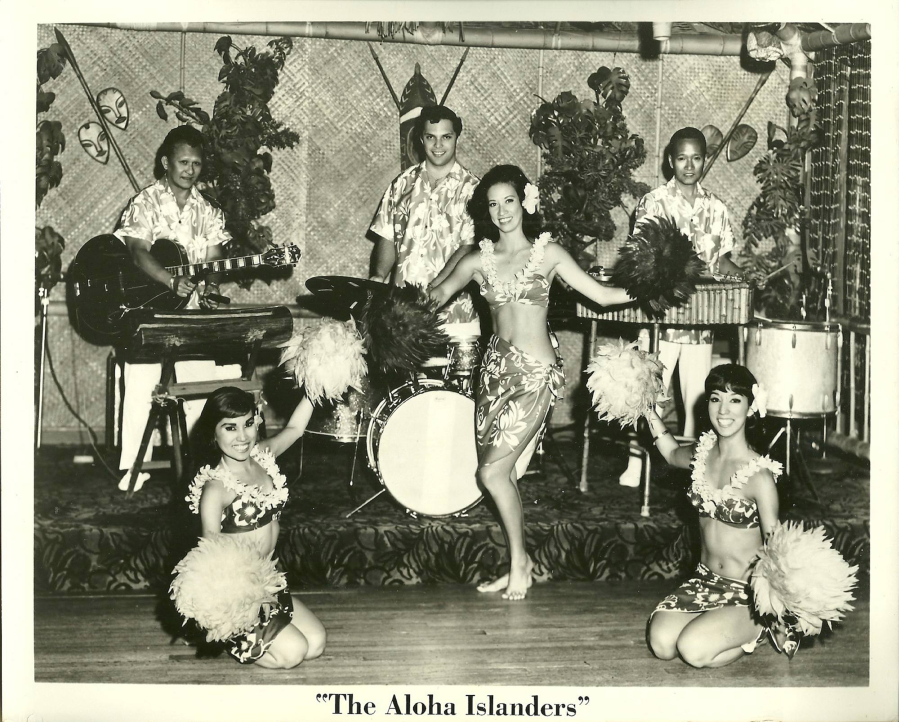It’s your kuleana to bring your own ‘omole wai. While you’re at it, bring sufficient gozas for the whole ‘ohana.
In English: It’s your responsibility to bring a water bottle. Bring enough lawn mats for the whole family, too.
This weekend’s “Three Days of Aloha” festival in Esther Short Park promises to be a bit more fun — if that’s even possible — as well as a bit more serious than in previous years.
The extra fun happens tonight (July 29), with a free screening of “The Hawaiian Room,” a new documentary film by Ann Marie Kirk, about a New York City nightclub that played a key role popularizing Hawaiian music and dance in America — and also provided a warm welcome and community node for island-born performers who’d never experienced anything like that huge, cold, crazy North American metropolis.
If You Go
• What: Three Days of Aloha in the Pacific Northwest.
• When: 5 to 9 p.m. July 29 and 10 a.m. to 7 p.m. July 30. (Clark College workshops are 9 a.m. to 3 p.m. July 29.) A special screening of the documentary film “The Hawaiian Room” July 29 at dusk, preceded by special guests.
• Where: Esther Short Park, Columbia and West Eighth streets, Vancouver. (Clark College is at 1933 Fort Vancouver Way.)
• Cost: Free. (Clark College workshops generally around $75 or more.)
• On the web: hawaiianfestivalpnw.com or kekukuifoundation.org
“The Hawaiian Room” starts rolling today at dusk — but you can help transform the park into an open-air Hawaiian Room as early as 5 p.m., when the annual Hapa Haole Hula Competition begins. According to the rules, solo and group hula dancers, and the music that accompanies them, must all be in the classic “Hapa Haole” style of the early 20th century — when cultural crossover between Hawaii and the mainland generated a boatload of unforgettably poppy English-language tunes, such as “Little Grass Shack,” “Hukilau” and “Tiny Bubbles.”
There are numerous age, gender and style divisions, and winners selected by a panel of expert judges will receive prizes and recognition — and an invitation to enjoy some additional spotlight during the next day’s main event.
That’s the Ho’lke and Hawaiian Festival, running from 10 a.m. to 7 p.m. July 30 and filling the park with lots more song and dance, food and drink, arts and crafts, activities for all ages. Top dancers and musicians from across the U.S. and Canada (and Hawaii) are regular attendees — and so are thousands of fans — so you’re sure to enjoy plenty of spectacular sights and sounds, and come away simply brimming with what natives call the “aloha spirit.”
(Word to the early bird: this three-day festival actually began on July 28, with workshops at Clark College on topics such as hula dancing, ukulele playing, Hawaiian stories and values, lei making and even canoe paddling; those start up again bright and early July 29, but you must show up in person to register and pay. Same-morning registration is also available for an 8 a.m. July 30 “Aloha 5K Fun Run” along the Columbia River waterfront. Visit the website for complete information.)
Bottle ban
Here’s the serious part. This year, for the first time, Three Days of Aloha has a theme, and it’s “E Malama i ka ‘Aina.” That means “caring for the land.”
What it really means is, no plastic water bottles at the event, which has been declared a Plastic-Free Zone. So have all happenings hosted by the Ke Kukui Foundation, which promotes Hawaiian and Polynesian culture through classes and workshops as well as several big community events each year.
“This is a very important concept to us. It’s a big theme,” said Ke Kukui board president Mari Helenihi. “Plastic bottles are a huge problem for the fish and wildlife on beaches in Hawaii.”
Scientists surveying Hawaiian beaches for debris from the 2011 Japanese tsunami found precious little of that treasure, it was recently reported; what they did find, in shockingly vast quantities, was run-of-the-mill plastic pollution.
“Most of it seemed to be ordinary garbage carelessly tossed away by humans,” the Washington Post reported. “All in all, plastic accounted for 47 percent of the debris identified on Hawaiian shorelines.”
The American Chemistry Council estimates that the average consumer uses 166 plastic water bottles each year, and recycles very few of them. Estimates of the number of individual plastic bottles that Americans just throw away every year begin at around 22 billion and go as high as 35 billion.
Plastic doesn’t decompose like organic material — it just breaks apart, into small and even microscopic fragments. The tinier it is, the easier it is for birds, fish and other sea creatures — not to mention human beings — to ingest or even just absorb it.
The Ke Kukui Foundation has asked all its event vendors not to sell plastic water bottles, and urges you to bring your own reusable bottle, or buy one at the venue.
“We’re taking on a huge expense on this, but we’ll have plenty of ice cold water for free,” Helenihi said.




